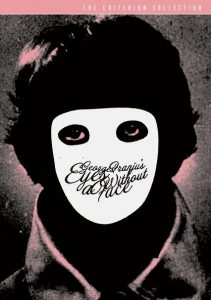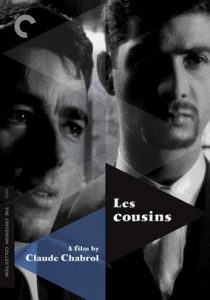Eyes Without a Face-1960
Director Georges Franju
Starring Pierre Brasseur, Alida Valli
Scott’s Review #922
Reviewed July 23, 2019
Grade: A
Eyes Without a Face (1960) is a macabre and twisted French-Italian horror film co-written and directed by Georges Franju. It is based on Jean Redon’s novel, which is the same name.
The film cover art (see above) is flawless and terrifying. It induces the creeps by only giving a glimpse, causing the recipient to be curious and attempt to analyze the meaning.
The film is nestled into a short one-hour and thirty-minute package that is time to scare the audience to death with many fantastic and gruesome elements, severely limiting the gore, which only adds to the horrific nature.
Because of its subject matter, the film was highly controversial in 1960 and was subsequently either loved or reviled by its audiences.
Eyes Without a Face is riveting because the audience empathizes with the characters and takes action to correct their wrongs despite the main character’s undeniable crazyness.
The complex emotions of guilt and obsession are commonalities, making it a layered and complex horror film that appears on many Top Ten genre lists.
The film is not for the faint of heart.
Doctor Genessier (Pierre Brassier) is a brilliant and successful physician who specializes in plastic surgery. After a vicious car accident that he is to blame for, he attempts to repair the ruined face of his daughter, Christiane (Edith Scob), a victim of the wreck.
But his plan to give his daughter her looks back involves kidnapping young girls and removing their faces. He is aided in his machinations by his assistant, Louise (Alida Valli), who kidnaps the young woman and helps him in the laboratory, acting as a surrogate mother to Christiane.
Louise aids Génessier partly because he helps restore her damaged face in events before the film begins.
Scob is the stand-out character, containing an innocent and quietly melancholy existence as she is the apparent victim of the story. Her defeated posture, while resiliently hopeful and demure, is complex for an actress to carry, and she defines grace and poise.
Brasseur and Valli each deliver the goods in different ways. Valli, haunting in her best horror effort Suspiria (1977), is mesmerized by her doctor and savior so that the relationship is almost cult-like.
Brasseur is strangely heroic, as he steals lives to save lives, so his character is extraordinarily complex.
The surgery scenes are chilling, featuring white, starchy uniforms worn by a doctor, assistant, and victim. The scenes could almost be mechanical tutorials offered to first-rate medical students with scholarly intentions. If this were not a horror film, the look would be documentary-style.
Genessier calmly cuts an entire circular length of his victim as a hint of blood slowly oozes down the sides of her face in an almost tender fashion.
The film, made in 1960, is not the 1980s slasher film image that encompasses non-horror film-goers’ preconceptions. It has a gorgeous texture.
The best scene occurs when one of Genessier’s victims, lying on a gurney, comes to and gazes at a figure leaning close to her. The camera turns to the figure, revealing a blurry but recognizable image of Christiane sans the face-like mask she usually wears throughout the film.
As the victim shrieks in horror, Christiane slowly backs away from her amid a feeling of pain and heartbreak, remembering how much of a freak she must appear to others. The scene is sad and grotesque at the same time.
Horror films often get bad raps, but poetic and stylized horror films are a diamond in the rough.
Eyes Without a Face (1960) achieves its place in the cinematic archives with brilliant black and white cinematography entrenched in a Gothic, chilling story with characters whose motivations can be dissected and studied long after the film ends.
This keeps the viewer thinking and deserves repeated viewings to capture all the gems it offers.

